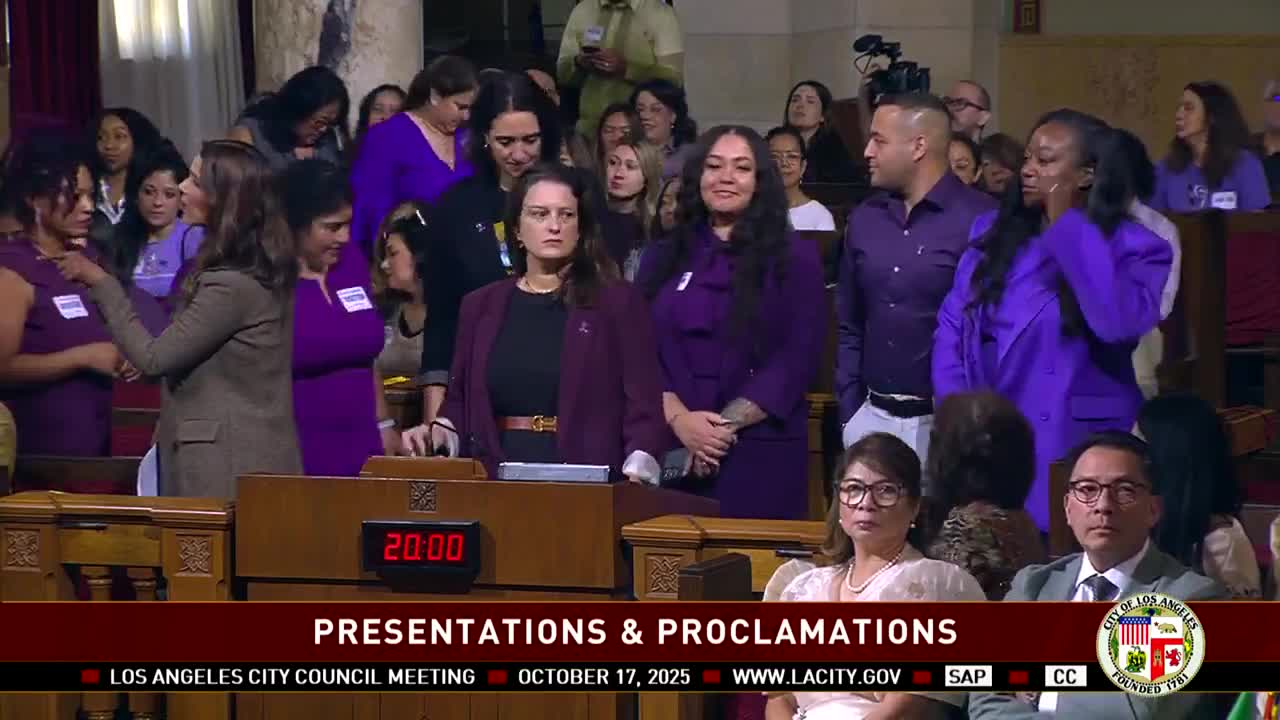Council highlights domestic violence investments as federal funding risks threaten services
Get AI-powered insights, summaries, and transcripts
Subscribe
Summary
Council members marked Domestic Violence Awareness Month and described recent city investments — including new shelter beds, a task force and a grant — while warning federal program funds are at risk because of a federal shutdown.
Los Angeles City Council members and city officials used a presentation recognizing Domestic Violence Awareness Month to outline recent local investments in survivor services and to warn that federal funding disruptions threaten those gains.
Councilmember Katie Yaroslavsky opened the presentation by citing recent city and law enforcement data: she said the Los Angeles Police Department received about 43,000 domestic‑violence–related calls last year and responded to nearly 15,000 domestic‑violence crimes. Yaroslavsky also said “13 percent” of homicide victims in Los Angeles County were related to domestic violence and that, per the 2025 homeless count, 41 percent of people experiencing homelessness have experienced domestic violence.
Why it matters: City leaders told the council the scale of domestic violence in Los Angeles is driving demand for shelter, legal help and wraparound services; they said city investments are intended to expand capacity and prevent survivors from entering homelessness.
City actions and programs described: Council members and officials outlined several recent efforts. • Shelter capacity: Council members said the city added 188 new domestic‑violence shelter beds in 2024 and has sustained funding to support survivor housing and services. • Survivors First: City staff reported the Survivors First program, which provides rental assistance and wraparound services, has a reported housing retention rate of about 92 percent for participating survivors. • DV restraining‑order enforcement task force: Yaroslavsky said the city created a task force focused on enforcement of domestic‑violence restraining orders and that the task force recently secured a $1,000,000 grant to expand its work.
Federal funding concerns: Council members warned that federal disruptions threaten survivor programs. Yaroslavsky said staff at the federal Office on Violence Against Women and other federal rental assistance programs had been furloughed and that the city was told those programs could “run out of money by November 1.” Hernandez said survivors often face barriers tied to immigration checks and enforcement that can deter them from seeking help.
City staff remarks: Abigail Marquez, who described the Consolidated Plan and CDBG administration earlier in the meeting, thanked council members for sustained budget support and said the city has developed “a comprehensive continuum of care for the very first time in our city's history,” including prevention and flexible funding to support legal and counseling services.
Limits and next steps: Speakers framed the measures as important progress but not a resolution of the broader crisis. Council members asked for continued coordination among city agencies and partners and for oversight of federal funding threats.
Quotes: “Survivors deserve protection and support through every single part of their journey,” Yaroslavsky said. Councilmember Hernandez said, “When we talk about domestic violence, we're talking about care and what happens when care is denied.”
